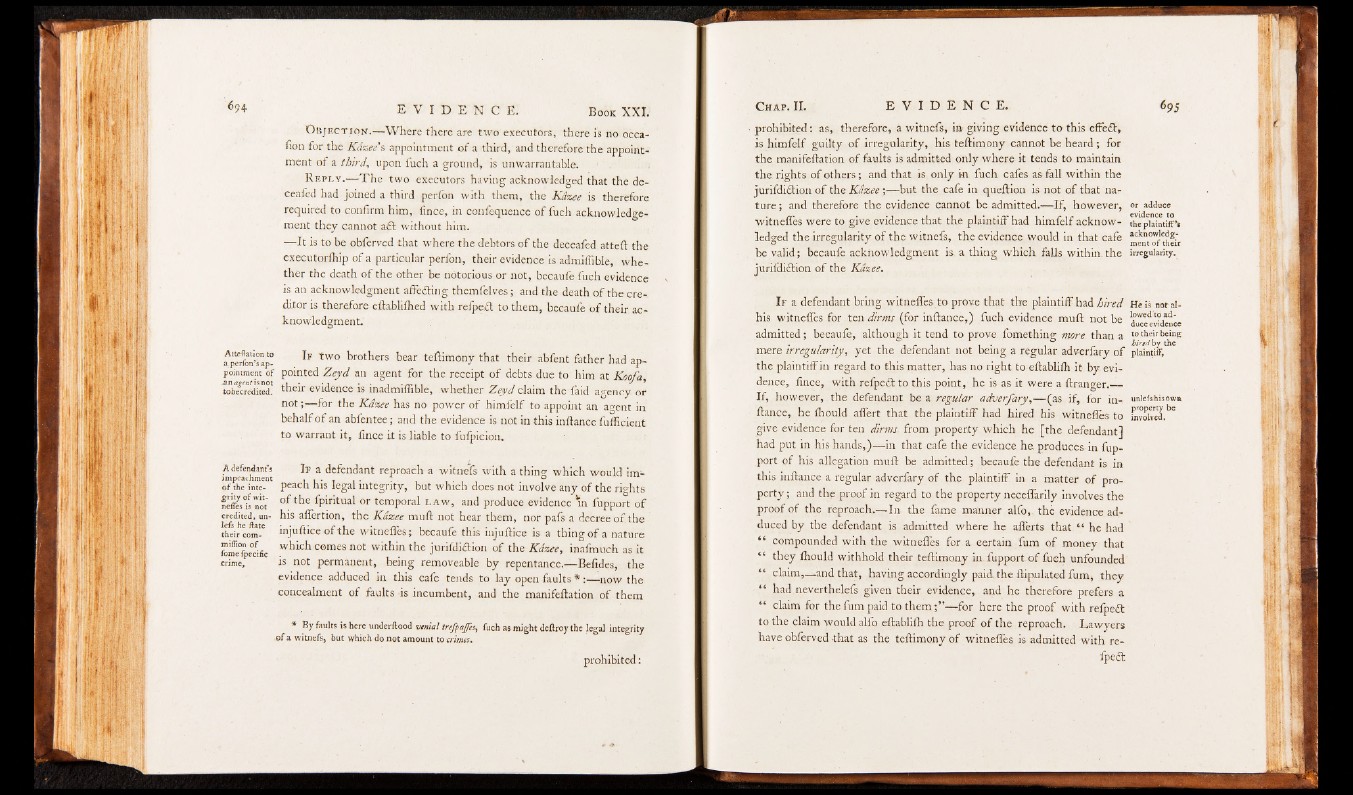
O bjection.— Where there are two executors, there is no occasion
for the Kdzee's appointment of a third, and therefore the appointment
of a third, upon fuch a ground-, is unwarrantable.
R eply.—-The two executors having acknowledged that the de-
ceafed had joined a third perfon with them, the Kdzee is therefore
required to confirm him, fince, in confequence of fuch acknowledgement
they cannot aft without him.
— It is to be obferved that where the debtors of the deceafed atteft the
executorlhip of a particular perfon, their evidence is admiflible, whether
the death of the other be notorious or not, becaufe fuch evidence
is an acknowledgment afFefting themfelves; and the death of the creditor
is therefore eftablifhed with refpeft to them, becaufe of their acknowledgment.
If two brothers bear teftimony that their abfent father had appointed
Zeyd an agent for the receipt of debts due to him at Koofa,
their evidence is inadmiflible, whether Zeyd claim the faid agency or
not >—for the Kdzee has no power of himfelf to appoint an a cent in
behalf of an abfentee; and the evidence is not in this inftance fufficient
to warrant it, fince it is liable to fufpicion.
Atteftat-ion to
a performs appointment
of
A defendant’s If a defendant reproach a witneTs with a thing which would imimpeachment
u u • r i • • , . ° of the inte- peach his legal integrity, but which does not involve any of the rights
neffcs°is not Spiritual or temporal law, and produce evidence 'in fupport of
credhed, un- his aflertion, the Kdzee muft not hear them, nor pafs a decree of the
their com-C injuftice of the witnefles; becaufe this injuftice is a thing o f a nature
Jbme°f edfic comes not within the jurifdiftion of the Kdzee, inafmuch as it
crime, is not permanent, being removeable by repentance.— Befides, the
evidence adduced in this cafe tends to lay open faults * now the
concealment of faults is incumbent, and the manifeftation of them
* B y faults is here underftood venial trefpajfes, fuch as might deftroy the legal integrity
o f a witnefs, but which do not amount to crimes.
.an agent is not
tobecredited.
prohibited:
prohibited: as, therefore, a witnefs, in giving evidence to this effeft,
is himfelf guilty of irregularity, his teftimony cannot be heard; for
the manifeftation of faults is admitted only where it tends to maintain
the rights of others; and that is only in fuch cafes as fall within the
jurifdiftion of the Kdzee ;— but the cafe in queftion is not of that nar
ture; and therefore the evidence cannot be admitted.— If, however, or adduce
witnefles were to give evidence that the plaintiff had himfelf acknow- the plaintiff*.
ledged the irregularity of the witnefs, the evidence would in that cafe ackn°w'<%; ° 0 J f ' ment or their
be valid; becaufe acknowledgment is. a thing which falls within, the irregularity,
jurifdiftion of the Kdzee.
I f a defendant bring witnefles to prove that the plaintiff had hired He is noral-
his witnefles for ten dirms (for inftance,) fuch evidence muft not be dtTeeridence
admitted; becaufe, although it tend to prove fomething more than a to their being
mere irregularity, yet the defendant not being a regular adverfary of plaintiff,1 *
the plaintiff in regard to this matter, has no right to eftablifh it by evidence,
fince, with refpeft to this point, he is as it were a ftranger._
If, however, the defendant be a regular adverfary,— (as if, for in-, unlefshisow»
fiance, he fhould affert that the plaintiff had hired his witnefles to fnralved.
give evidence for ten dirms. from property which he [the defendant]
had put in his hands,.)— in that cafe the evidence he produces-in fupport
of his allegation muft be admitted ; becaufe the defendant is in
this inftance a regular adverfary of the plaintiff in a matter of property
; and the proof in regard to the property neceflarily involves the
proof of the reproach.— In the fame manner alfo,. the evidence adduced
by the defendant is admitted where he aflerts that “ he had
“ compounded with the witnefles for a eertain fum of money that
“ they fhould withhold their teftimony in fupport of fueh unfounded
“ claim,—and that, having accordingly paid, the ftipulated fum, they
“ had neverthelefs given their evidence, and he therefore prefers a
“ claim for the fum paid to them 5”— for here the proof with refpeft
to the claim would alfo eftablifh the proof of the reproach. Lawyers
have obferved -that as the teftimony of witnefles is admitted with refpeft